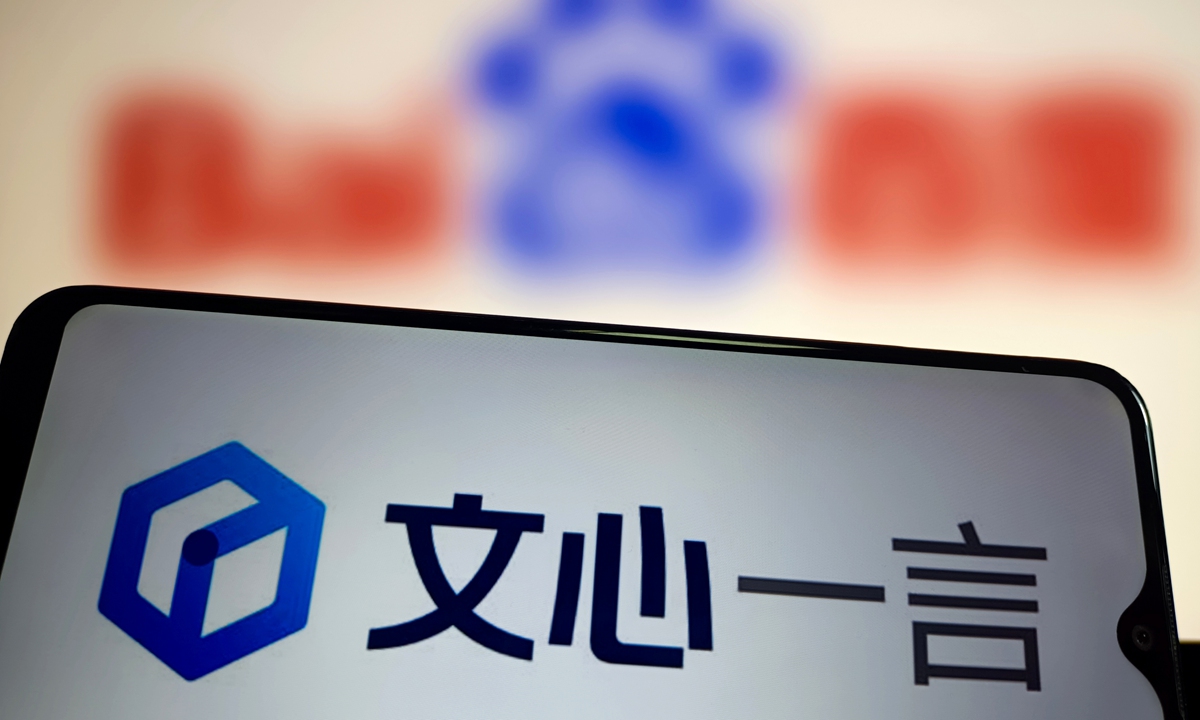Baidu strongly denies rumor of link between its AI tool and China’s military research

Baidu's generative artificial intelligence product ERNIE Bot Photo: VCG
China's tech giant Baidu on Monday strongly denied allegations of ties between its generative artificial intelligence (AI) product and China's military research after some media outlets claimed the company's ChatGPT-like ERNIE Bot was engaged in the training of the AI system of the People's Liberation Army (PLA) of China, leading to Baidu's shares plunging by around 10 percent.
Experts on Tuesday criticized Western media's claims that were based on non-authoritative sources and which led to a misunderstanding and stigmatization of the company.
The South China Morning Post reported on Friday that a university affiliated with the PLA Strategic Support Force was teaching its experimental AI system more about facing unpredictable human enemies by testing the AI system with the help of Baidu's large language model ERNIE Bot.
"Baidu has not engaged in any business collaboration or provided any tailored service to authors of the academic paper or any institutions with which they are affiliated," Baidu told the Global Times on Monday, emphasizing that ERNIE Bot is available to and can be used by the general public.
The basis of the report is a research paper published in the Chinese academic journal Command Control & Simulation in December 2023 by researchers from the PLA's Information Engineering University, where researchers used the US military invasion of Libya in 2011 as an example. They input the forces and weapons deployment of both sides of the conflict, as well as the desired targets in order for ERNIE Bot, which debuted in March 2023, to predict the US army's combat strategy.
Baidu said that the academic paper mentioned several other large language models such as GPT3.5, GPT-3.5-turbo, GPT4, HTML-T5, as well as Baidu's ERNIE Bot and described how the authors received responses from them, emphasizing that the functions used by the authors are available to any user interacting with generative AI tools.
"The South China Morning Post, the first media outlet that reported on this academic paper, has clarified and corrected its original media report," said the Chinese internet giant in a statement on Monday, vowing that the company will operate its AI-related products and businesses in compliance with applicable laws and regulations and best corporate practices.
Some media reported that the speculative link raised concerns that the US may consider imposing sanctions on Chinese firms as part of efforts to contain its geopolitical rival. Analysts criticized the unfounded claim, saying it has sparked baseless and unfounded suspicions, causing great harm to Chinese companies.
The original media report is based on non-authoritative sources, such as a cooperation document between Baidu and a certain department, which was just a speculation in an academic article. However, the report was then adopted by multiple media outlets, triggering a misunderstanding of the company and its shares suffering a huge loss, Liu Dingding, a Beijing-based tech analyst, told the Global Times on Tuesday.
"Some Western media always tend to spread the so-called threat posed by China. Why don't they talk about the threats caused by ChatGPT developed by the US?" Song Zhongping, a TV commentator, told the Global Times.
OpenAI has deleted language expressly prohibiting the use of its technology for military purposes, it was reported.
The US-based Intercept website reported on Friday that in a quiet update to its usage policy, OpenAI lifted a broad ban on the use of ChatGPT for tasks related to "military and warfare," which seeks to dictate how powerful and immensely popular tools like ChatGPT can be used.
Liu said the application of different kinds of large language models in the military is technically feasible and will definitely emerge in the future. He noted that China has already become aware of the problems AI brings and has introduced a series of regulations, such as Interim Measures for the Management of Generative Artificial Intelligence Services and Position Paper on Strengthening Ethical Governance of Artificial Intelligence, to ensure the secure and controllable development of AI technologies.



